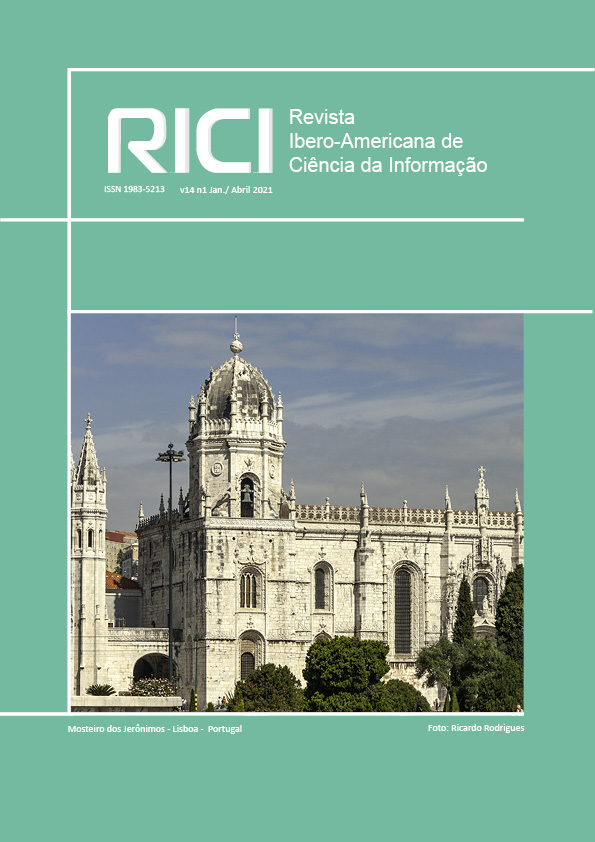Data literacy: Design of a new training scenario for the university context
DOI:
https://doi.org/10.26512/rici.v14.n1.2021.35521Keywords:
Data literacy, Data Science, Higher education, Information literacy, Digital skillsAbstract
The main objective of the study is to design a proposal for training in data literacy, as a zero course, in which students receive basic or initial instruction in the identification, location, visualization and retrieval of data sets, arising in the context of open data and data science. The work is based on a review of the existing literature on data literacy and an analysis of data-based practices in the field of Higher Education. The study will provide a training proposal in data literacy that contemplates the digital and transversal competences that students must acquire, the learning objectives and contents, as well as the tasks, resources and tools that make this possible.
Downloads
References
ALEXANDER, B.; ADAMS BECKER, S.; CUMMINS, M.; HALL, C. Digital Literacy in Higher Education, Part II: An NMC Horizon Project Strategic Brief. V. 3.4, August 2017. Austin, Texas: The New Media Consortium, 2017. Recuperado de: https://library.educause.edu/-/media/files/library/2017/8/2017nmcstrategicbriefdigitalliteracyheii.pdf
ALONSO ARÉVALO, J. La gestión de datos de investigación en el horizonte de las bibliotecas universitarias y de investigación. Cuadernos de Documentación Multimedia, n. 30, p. 75-88, 2019. https://doi.org/10.5209/CDMU.62806
ARREGUIT O´NEILL, S. Fomento de la alfabetización de datos en todos los ámbitos. Aula Abierta, v. 48, n. 4, 2019. Recuperado de https://dialnet.unirioja.es/servlet/articulo?codigo=7261827
ATENAS, J.; HAVEMANN, L.; PRIEGO, E. Open Data as Open Educational Resources: Towards Transversal Skills and Global Citizenship. OpenPraxis, v. 7, n. 4, p. 377”“389, 2015. doi: http://dx.doi.org/ 10.5944/openpraxis.7.4.233
CANO M., J.J. Alfabetización de datos. Reflexiones iniciales sobre un saber necesario y emergente. Sistemas, n. 152, p. 18-29, 2019. https://doi.org/10.29236/sistemas.n152a4
COMISIÓN EUROPEA. Comunicación de la Comisión al Parlamento Europeo, al Consejo, al Comité Económico y Social Europeo y al Comité de las Regiones, sobre el Plan de Acción de Educación Digital. Bruselas, 17.1.2018 com(2018) 22 final. Recuperado de https://eur-lex.europa.eu/legal-content/ES/TXT/?uri=COM%3A2018%3A22%3AFIN
COMISIÓN EUROPEA Comunicación de la Comisión al Parlamento Europeo, el Consejo, el Comité Económico y Social y el Comité de las Regiones. Una Estrategia Europea de Datos. Bruselas, 19.2.2020 Com(2020a) 66 final. Recuperado de https://eur-lex.europa.eu/legal-content/ES/TXT/PDF/?uri=CELEX:52020DC0066&from=ES
COMISIÓN EUROPEA. Comunicación de la Comisión al Parlamento Europeo, el Consejo, el Comité Económico y Social y el Comité de las Regiones. Configurar el futuro digital de Europa. Bruselas, 19.2.2020 Com(2020b) 67 final. Recuperado de https://eur-lex.europa.eu/legal-content/ES/TXT/PDF/?uri=CELEX:52020DC0067&qid=1603445771976&from=ES
GRILLENBERGER, A.; ROMEIKE, R. Developing a theoretically founded data literacy competency model. In: WORKSHOP IN PRIMARY AND SECONDARY COMPUTING EDUCATION (WiPSCE’18), 13th Workshop, October 4”“6. Potsdam, Germany. Proceedings. New York: ACM, 2018. 10 p. https://doi.org/10.1145/3265757.3265766
PARLAMENTO EUROPEO. Comisión de Cultura y Educación. Informe sobre la educación en la era digital: retos, oportunidades y lecciones para el diseño de las políticas de la Unión Europea. (2018/2090(INI)). Recuperado de https://www.europarl.europa.eu/doceo/document/A-8-2018-0400_ES.pdf
PARRA VALERO, P. La biblioteca integrada como modelo de convergencia educativa en alfabetización en información. [Tesis doctoral]. Getafe: Universidad Carlos III, 2016. Recuperado de https://e-archivo.uc3m.es/bitstream/handle/10016/23078/parra_biblioteca_tesis_2015.pdf
RAFFAGHELLI, J. (2020). “Datificación” y Educación Superior: Hacia la construcción de un marco para la alfabetización en datos del profesorado universitario. Revista Interamericana de investigación, Educación y Pedagogía, v. 13, n. 1, 2020. DOI: 10.15332/25005421
RIDSDALE, C.; ROTHWELL, J.; SMIT, M.; ALI-HASSAN, H.; BLIEMEL, M.; IRVINE, D.; KELLEY, D.; MATWIN, S.; WUETHERICK, B. Strategies and Best Practices for Data Literacy Education. Knowledge Synthesis Report. Dalhousie University, 2015. Recuperado de: https://dalspace.library.dal.ca/bitstream/handle/10222/64578/Strategies%20and%20Best%20Practices%20for%20Data%20Literacy%20Education.pdf
RÜSCHOFF, B. Data-Driven Learning (DDL): the idea. Recuperado de http://archive.ecml.at/projects/voll/rationale_and_help/booklets/resources/menu_booklet_ddl.htm
VILA RODRÃGUEZ, K. Datos abiertos para el desarrollo de competencias en Educación Secundaria y Formación Profesional. [Trabajo de Fin de Máster]. Alicante: Universidad de Alicante, 2018. Recuperado de https://rua.ua.es/dspace/bitstream/10045/76547/1/Datos_abiertos_para_el_desarrollo_de_competencias_en_la_Vila_Rodriguez_Katia.pdf
VILLA, A.; POBLETE, M. Aprendizaje basado en competencias. Una propuesta para la evaluación de las competencias genéricas. Bilbao: Universidad de Deusto, 2008.
Downloads
Published
How to Cite
Issue
Section
License
Copyright (c) 2020 Yolanda Martín González, Ana Iglesias Rodríguez

This work is licensed under a Creative Commons Attribution 4.0 International License.
Copyright Notice
Authors who publish in this journal agree to the following terms:
- Authors retain copyright and grant the journal right of first publication with the work simultaneously licensed under the Creative Commons Attribution License 4.0, allowing the sharing of work and recognition of the work of authorship and initial publication in this journal.
- Authors are able to take on additional contracts separately, non-exclusive distribution of the version of the paper published in this journal (ex.: distribute to an institutional repository or publish as a book), with an acknowledgment of its initial publication in this journal.
- Authors are permitted and encouraged to distribute their work online (eg.: in institutional repositories or on their website) at any point before or during the editorial process, as it can lead to productive exchanges, as well as increase the impact and citation the published work.
















